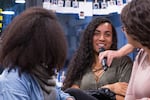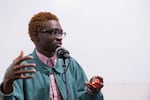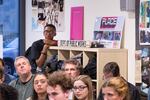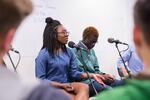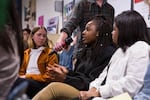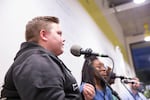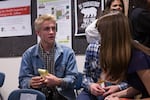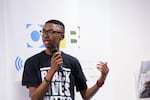
Tyler White, a De La Salle junior, helped facilitate the youth town hall on the American Dream at The CENTER in North Portland on Tuesday, Oct. 25, 2016.
Bradley W. Parks / OPB
For the past couple of months, Think Out Loud has been exploring ideas about the "American Dream." We've been talking about questions of identity, equity and opportunity with Oregonians from all walks of life leading up to the November 2016 election.
As part of this broader conversation, about three dozen high school students joined us for a kind of town hall in cooperation with a new youth-centered, collaborative hub called “The CENTER” in North Portland.
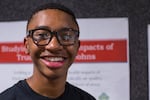
Tyler White
Bradley W. Parks / OPB
Tyler White is a 16-year-old junior at De La Salle North. He says the American Dream is about having the "the access and the opportunity to better your circumstances."
White says the dream is more powerful for some than for others.
"You almost have to be in some place of peril and coming from a bad, disenfranchised community to have the American Dream," he said, "because if you're already someone who comes from a place where you're comfortable, in social and political arenas, then you really don't have to think about the American Dream. You already have it."
"Think Out Loud" host Dave Miller asked if White aspired to the American Dream as he described it. White said he does not.
"I've always been kind of confused because I am a black male," he said. "And the history of black people in this county is one that is very horrific in many rites, but also very strong and hopeful and resilient."
White says he has two parents, married to each other, with good jobs, living with him in a home they own.
"So I've always been the exact opposite of what black males are supposed to be in America and what a black family looks like," he said.
He acknowledges that he hasn't experienced some of the hardships some in black communities have because of his economic advantages, but he says, he feels compelled to make life better for everyone, especially in African-American communities.

Grace Wong
Bradley W. Parks / OPB
Some of the teenagers told Dave Miller that their ideas about the American Dream were informed by having parents who came from other countries. Catlin Gabel senior Grace Wong says her father’s parents died on a boat coming to the United States during the Vietnam War. Wong says her parents have sometimes driven her past a house on Northeast Killingsworth Street in Northeast Portland.
"All 15 of my dad's closest family all lived in this two-bedroom house for so many years and tried to get their roots down in Portland," she said. "But somehow, by some miracle, my father got himself through college, and he's got a really great job and he's been able to put me through 13 years of private school."
She describes what she calls a big recent moment for her family:
"My father didn't have parents to pay for his college — he washed dishes in high school," she said. "And I'm now a senior, and I'm applying to college, and we got to press the button that says, 'No, I will not be asking for financial aid.' I will be able to pay the entire four years of $50,000-plus tuition."
Many of the students discussed their aspirations and plans for the future, and their take on the major party candidates in the 2016 election. But when it came to the issue of whether their votes would matter when they turned 18 and can register, they were surprisingly divided.
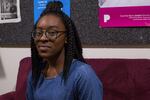
Aaliyah Joseph
Bradley W. Parks / OPB
Aaliyah Joseph, a 16-year -old junior at De La Salle North, felt strongly that her vote would not count.
"Because at the end of the day, especially in America, the people who hold the power are the people with money," she said. "So at the end of the day, people who have money and who have the abilities and the education to want something and to want to do something can do it, and do it completely discreetly."
Kamaria Watson, a senior at Roosevelt High, felt the opposite:
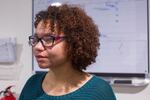
Kamaria Watson
Bradley W. Parks / OPB
"I find it really hard to believe that my vote doesn't matter. Especially because I come from a multicultural background," she said. "About half my family, almost, comes from the deep South. And they were all slaves, and they went through the civil rights movement ... Everything was about your voting rights and trying to become equal in that sense."
Watson says her mother's family immigrated from Germany during the holocaust.
"So their voting rights matter too, because they were immigrants at the time, and they weren't accepted in American society," she said. "It's more impactful on a local level than it is a nationwide one, but at the end of the day, your vote does have some sort of sway. ...
"Because if enough of American society does vote one way, they are going to have to pay attention to it."



